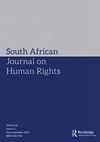Is the automatic loss of South African citizenship for those acquiring other citizenships constitutional? Democratic Alliance v Minister of Home Affairs
IF 0.6
4区 社会学
Q3 LAW
引用次数: 0
Abstract
For an increasing number of people, global mobility is a feature of their lives. Employment opportunities may arise in countries far removed from one’s place of birth; one may meet a significant other and seek to re-locate. For some, new citizenships may be acquired for instrumental reasons: ease of movement, as Covid-19 national restrictions have demonstrated, often requires not only applying for permission to reside indefinitely in another country but also naturalisation; for others, it may reflect a deeper significance, representing a stronger connection to a polity to which one wishes to belong and to participate politically. What acquisition of a new citizenship does not ipso facto mean is that an individual wishes to lose the citizenship of their country of origin, to which they may retain intense and deep ties. The legal consequences of the acquisition of foreign citizenship were the subject of Democratic Alliance v Minister of Home Affairs, a 2021 case in the High Court of South Africa (Gauteng division, Pretoria). The Democratic Alliance unsuccessfully challenged the constitutionality of s 6 of the Citizenship Act 68 of 1995. This provision stipulates that adult citizens automatically (de lege) lose their South African citizenship when they ‘freely and voluntarily’ acquire another citizenship (except through marriage) without first applying for and obtaining a ministerial certificate authorising its retention. The applicants argued this policy is irrational and that it violates several那些获得其他公民身份的人自动丧失南非公民身份符合宪法吗?民主联盟诉内政部长
对越来越多的人来说,全球流动是他们生活的一个特点。就业机会可能出现在远离出生地的国家;一个人可能会遇到另一个重要的人并寻求重新定位。对一些人来说,获得新公民身份可能是出于工具性原因:正如新冠肺炎国家限制所表明的那样,行动方便往往不仅需要申请无限期居住在另一个国家的许可,还需要归化;对另一些人来说,它可能反映出一种更深层次的意义,代表着与一个希望归属和参与政治的政体之间更紧密的联系。获得新公民身份并不意味着个人希望失去原籍国的公民身份,他们可能与原籍国保持着密切而深厚的联系。获得外国公民身份的法律后果是2021年南非高等法院(比勒陀利亚豪登省)民主联盟诉内政部长案的主题。民主联盟对1995年第68号《公民法》第6条的合宪性提出质疑,但未获成功。该条款规定,成年公民在未事先申请并获得授权保留南非公民身份的部长证书的情况下“自由自愿”获得另一种公民身份(通过婚姻除外),将自动(根据法律)失去其南非公民身份。申请人认为这项政策不合理,违反了
本文章由计算机程序翻译,如有差异,请以英文原文为准。
求助全文
约1分钟内获得全文
求助全文

 求助内容:
求助内容: 应助结果提醒方式:
应助结果提醒方式:


